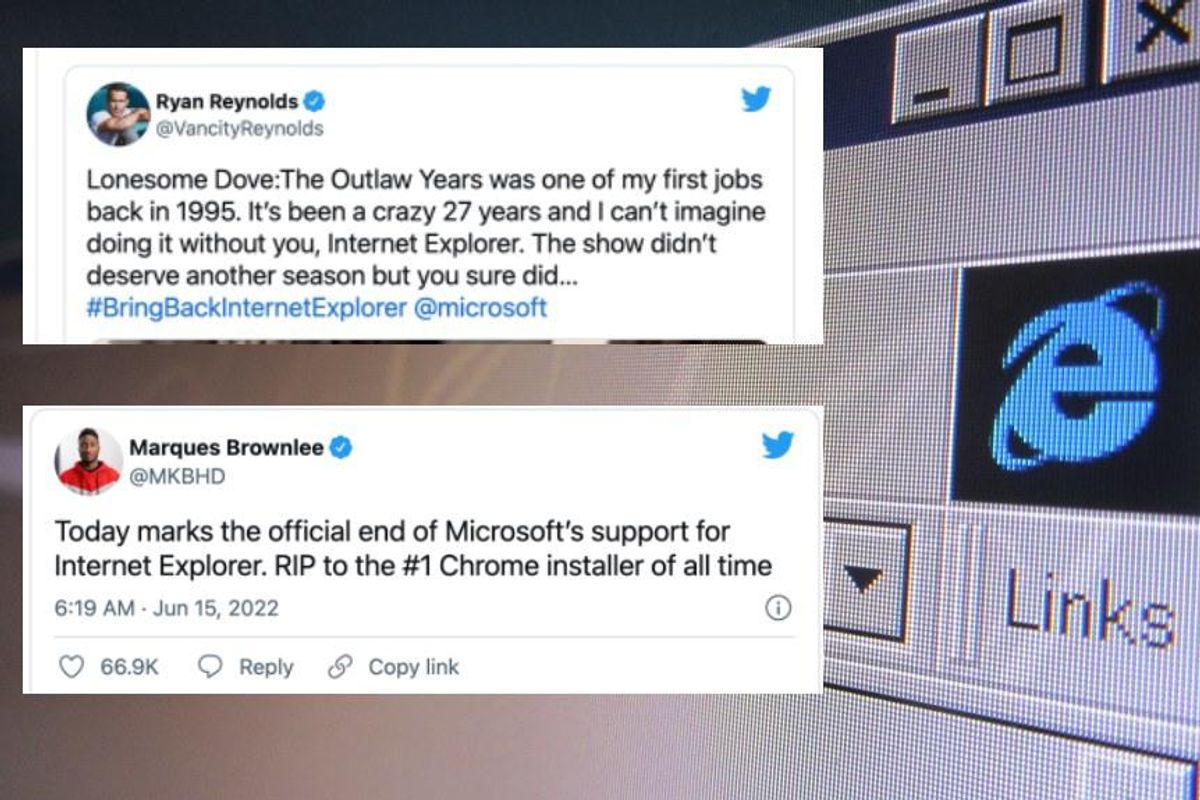Internet Explorer is being hilariously serenaded after 27 long years of browsing history
So long, old friend.
Celebrities like Ryan Reynolds say goodbye to Internet Explorer
If you were an internet user in the '90s, you absolutely had a run-in with Internet Explorer. In the early days of Microsoft Windows, it was hard to avoid—at some point, you almost always accidentally clicked on it. I remember the frenzy of trying to close it before it fully opened. Let's be honest, Internet Explorer was the worst. But it was also a seminal part of early internet culture. And even though no one uses it anymore, we certainly will miss it … maybe.
Microsoft announced in 2021 that Internet Explorer would cease to exist on June 15, 2022, and it's sticking to its word. "The Internet Explorer 11 desktop application will be retired and go out of support on June 15, 2022, for certain versions of Windows 10," its announcement read. Of course, people have taken to the internet to share their feelings, which are, of course, exactly as great as we'd expect from the internet.
"not internet explorer joining the 27 club," one user on Twitter wrote.
"Internet Explorer is finally shutting down on June 15 after 27 years. Seems it’s lagging a bit, I clicked “close” 26 years ago," someone else tweeted.
"Goodbye Internet Explorer. You’ll be missed by no one other than old boomers who don’t know how to install a better web browser," read another.
Many people gave props to the browser for one of its best functions: using it to download another browser. I remember using it to download Firefox and Chrome.
Today marks the official end of Microsoft’s support for Internet Explorer. RIP to the #1 Chrome installer of all time
— Marques Brownlee (@MKBHD) June 15, 2022
Even actor Ryan Reynolds got in on the memorials.
Lonesome Dove:The Outlaw Years was one of my first jobs back in 1995. It’s been a crazy 27 years and I can’t imagine doing it without you, Internet Explorer. The show didn’t deserve another season but you sure did…#BringBackInternetExplorer @microsoft pic.twitter.com/7rE7LM9FA9
— Ryan Reynolds (@VancityReynolds) June 15, 2022
Microsoft introduced Windows users to Internet Explorer way back in 1995 as the alternative to Netscape Navigator, which it went on to replace. We all remember that there was a point where you couldn't be a Windows user without being forced to use IE. It was so slow that downloading a picture could take as long as 10 minutes. I can see the little pages flying into the folder if I close my eyes.
According to AP, the Justice Department sued Microsoft in 1997 because it made IE a fundamental part of the user experience. It claimed Microsoft "violated an earlier consent decree by requiring computer makers to use its browser as a condition of using Windows." In 2002, Microsoft settled an antitrust battle over claims it created a Windows monopoly. The company faced a similar fight in Europe where regulators claimed that by tying Internet Explorer to Windows, it created a disadvantage for browsers like Mozilla Firefox and Chrome.
Just because Internet Explorer is joining AOL Instant Messenger, BlackBerry and the Microsoft Word paperclip in the internet graveyard doesn't mean that Windows is out of the browser game.
Goodbye internet explorer. Enjoy my little doodle… pic.twitter.com/FBAETeGEGK
— Malware Unicorn (@malwareunicorn) June 15, 2022
In 2015, Microsoft launched Microsoft Edge, which is going to be its primary browser. Microsoft describes Edge as "a faster, more secure and more modern browsing experience than Internet Explorer." It assures users that Microsoft Edge will still support the "legacy sites" that needed Internet Explorer to run.
"Instead of using 'this browser for this site' and 'that browser for that site,' now you can just use Microsoft Edge," it said.
Despite the alternative, you can't deny that the retiring of Internet Explorer is the end of a bygone era. It may have been slow and not user friendly, but it's part of our history. Thank you to the little browser that could.- 14. Just looking at this hurts - Upworthy ›
- Environmental anguish getting you down? Bill Nye and Arnold ... ›

